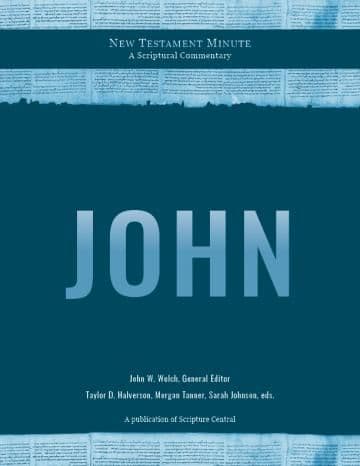Book
19 Chapters

On the basis of manuscript evidence, most commentators regard John 5:4 as a later addition to the text, added to explain the man’s comment in verse 7 about the troubling of the waters. Some believe the location to have been a center for pagan healing; if so, this demonstrates the man’s desperation—he was willing to turn to any source for help. In the face of this, Jesus’s question (rendered in modern idiom, “Do you want to become well?”) is all the more striking. While this may elicit a flicker of hope in the sick man, he still envisions his healing happening through some sort of interaction with the waters of the pool. The words “Rise, take up thy bed, and walk” must have come as a shock to him. We, too, may limit divine help in our life by boxing God’s intervention into our often-incorrect assumptions about how He works.
The healing is instantaneous (Greek eutheōs, “immediately”), but the narrator has omitted one crucial detail until the end: it is the Sabbath. Now the reader may recognize the significance of the event and the controversy that is about to ensue, which will occupy the rest of the chapter. In the Gospel of John, the phrase “the Jews” (Greek hoi Ioudaioi) often connotes not Jews as a people or the religion but the ruling aristocracy in Jerusalem who oppose Jesus. This is the sense in 5:10. Their injunction to the healed man probably reflects Jeremiah 17:21 (“bear no burden on the sabbath day”), but the original context of this verse prohibits the carrying of commercial wares, not personal property, on the Sabbath. In their zeal to prevent a Sabbath violation, they leaders do not seem to care about or even notice the miracle that has taken place.
Jesus’s warning to the man to “sin no more, lest a worse thing come unto thee” should not necessarily be taken to mean that the man’s original condition was the result of sin (see John 9:1–3). Rather, the force of these words is that the spiritually debilitating results of sin are even more severe than thirty-eight years of physical suffering. The man’s subsequent reporting of the matter to the authorities is probably not a betrayal of Jesus but rather an attempt to give Him credit for the miracle. Note his speech—he tells them that Jesus “made him whole,” not that Jesus was the one who had told him to carry his bed. However, the result of the matter is violent persecution.
Jesus’s claim that “my Father worketh hitherto” appeals to the sentiment that God’s work does not cease on the Sabbath—life, death, and the entire cosmic order remain in motion even on the day of rest. While this may soften the charge of Sabbath violation, Jesus has now approached blasphemy by claiming that God is His father. Note that Jesus does not refute this charge; it is not blasphemy because it is true. Instead, He expounds the relationship between the Father and Son. This is not entirely disconnected from the earlier Sabbath controversy; the two major themes of this discourse are giving life and pronouncing judgment, two major responsibilities of God that continue through the Sabbath.
These themes are also tied closely to one another. The Book of Mormon testifies that Jesus will bring about the Resurrection, which allows humankind to return to the presence of God to be judged.[fn]See 2 Nephi 9:22; Alma 33:22; 40:21; 42:23; Mormon 7:6.[/fn] John 5:25 reads, “The hour is coming, and now is,” which is another example of the Gospel of John’s realized eschatology, wherein the end-times redemption and vindication offered by Jesus is available to His followers in the present. Verse 29 stands significant, as it was Joseph Smith’s pondering of this verse that opened his view to the majestic vision of God’s plan for His children that became Doctrine and Covenants 76.
Jesus now turns His attention to the matter of witness and attestation. Deuteronomy 19:15 declares that a single testimony does not constitute legal proof; therefore, Jesus appeals to the witness of John the Baptist, of His miracles, and of His Father. The reference to the Baptist recalls the delegation sent in John 1:19–26, and the reference to Jesus’s works demonstrates that the miracles recounted in the Gospel of John are meant to reveal Jesus’s identity.
Jesus’s statement about the Father in verse 37 (“Ye have neither heard his voice at any time, nor seen his shape”) does not diminish the Old Testament appearances of God. On the one hand, “ye” may refer only to the specific leaders present, who have presumably never heard God’s voice nor seen His image. On the other hand, it emphasizes the fact that Jesus is the uniquely qualified revealer of the Father.
Verse 39 presents some difficulty. By form, the verb “search” (Greek pisteuō) may be either an imperative (the command “search!” as taken by the King James Version) or an indicative (the simple declarative statement “you are searching”), and the difference would change the logic of the argument. In either case, Jesus makes the point that the scriptures themselves do not bestow eternal life but that they point to Him, the true giver of such life. A failure to believe in Him, Jesus says, betrays a lack of belief (or understanding) of the scriptures; their author, Moses, will stand in condemnation of such failure to believe.
Book
19 Chapters
Items in the BMC Archive are made publicly available for non-commercial, private use. Inclusion within the BMC Archive does not imply endorsement. Items do not represent the official views of The Church of Jesus Christ of Latter-day Saints or of Book of Mormon Central.